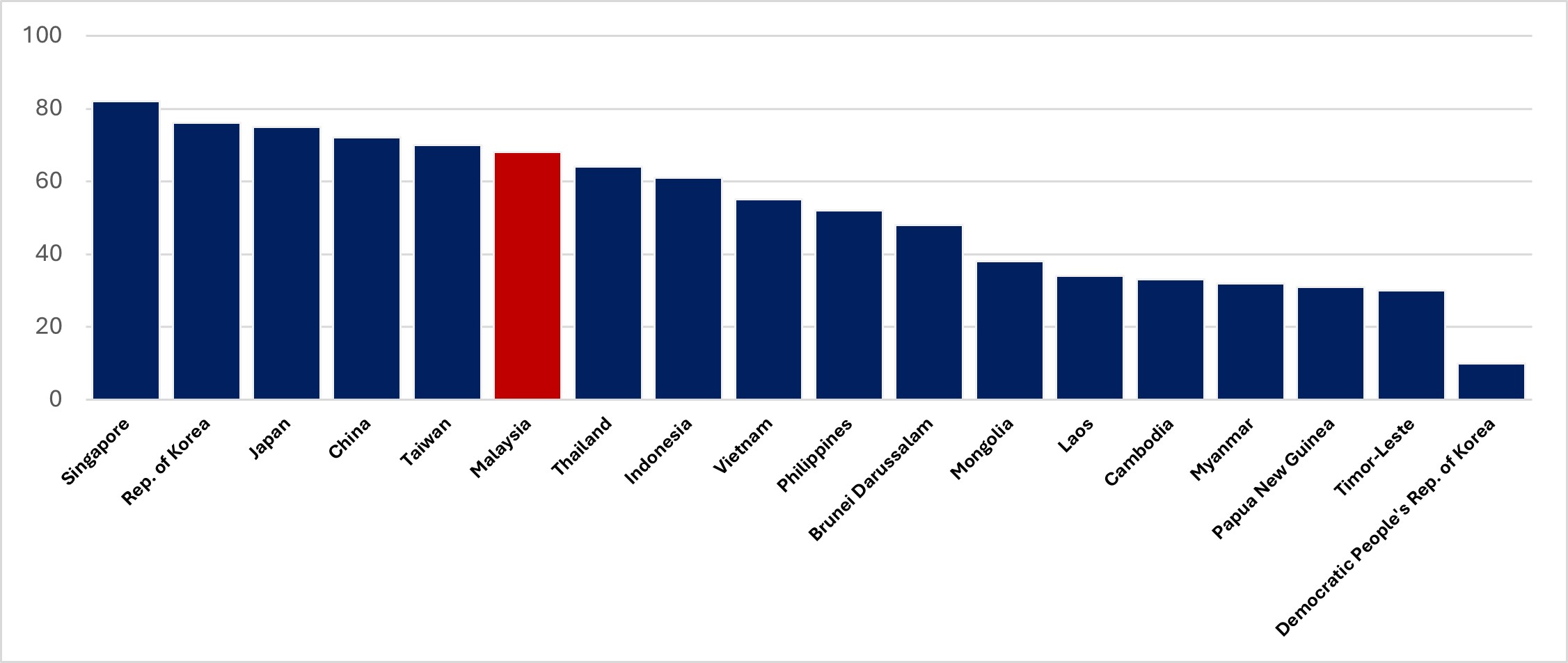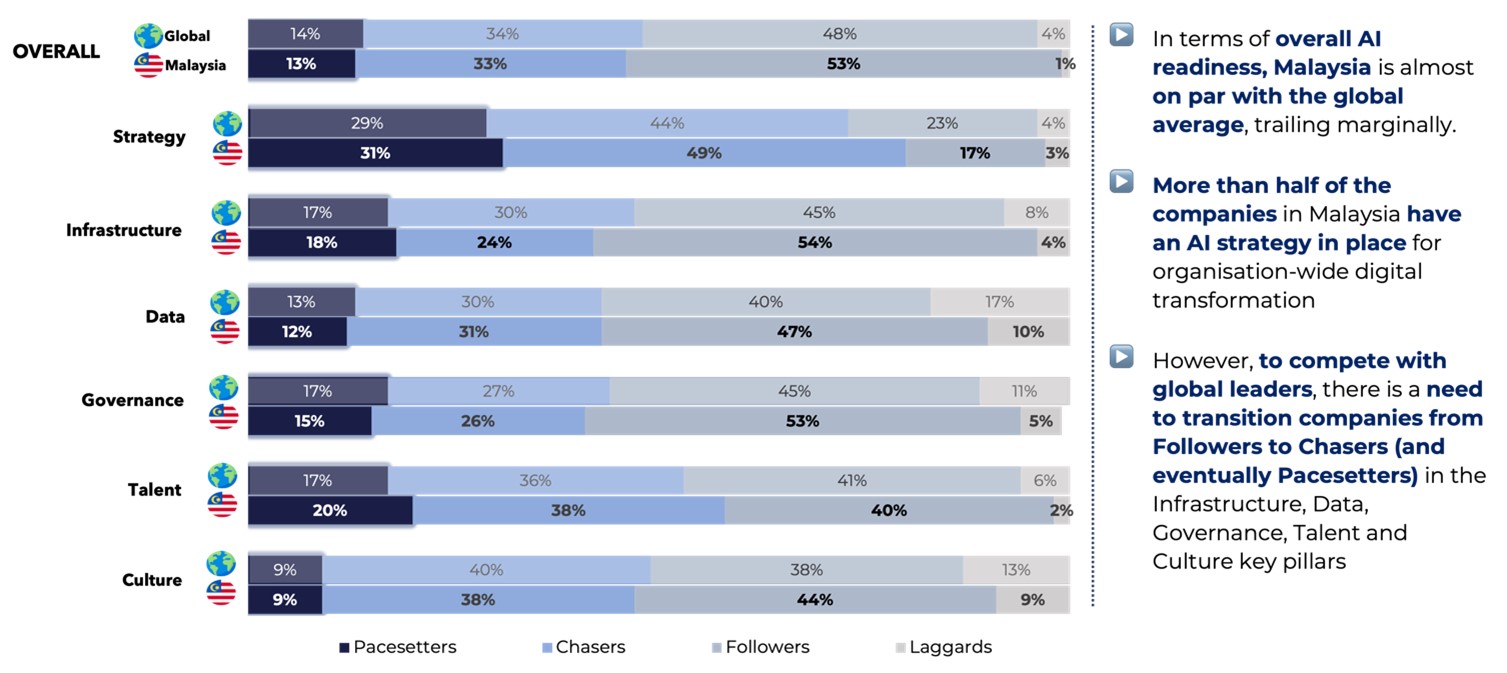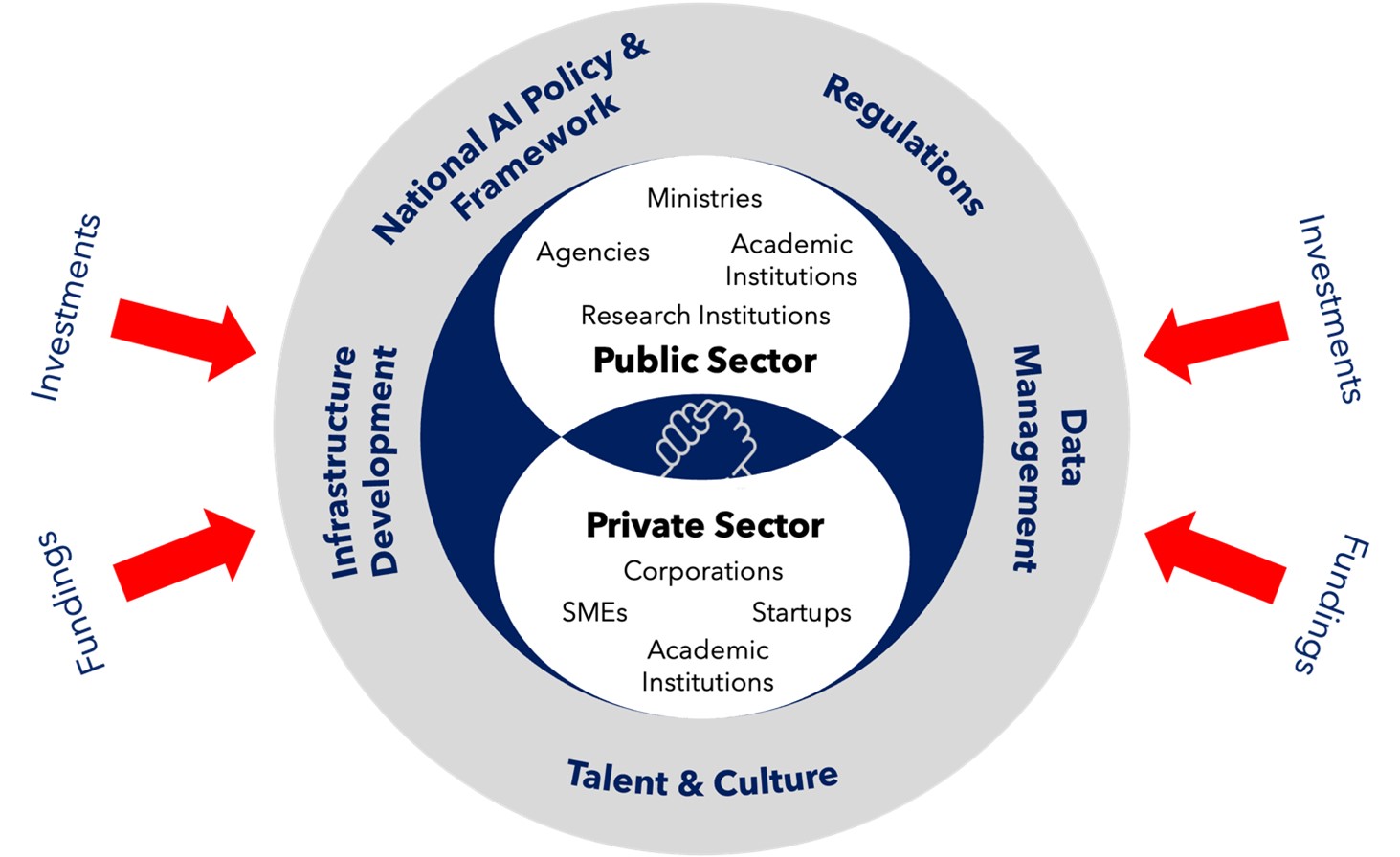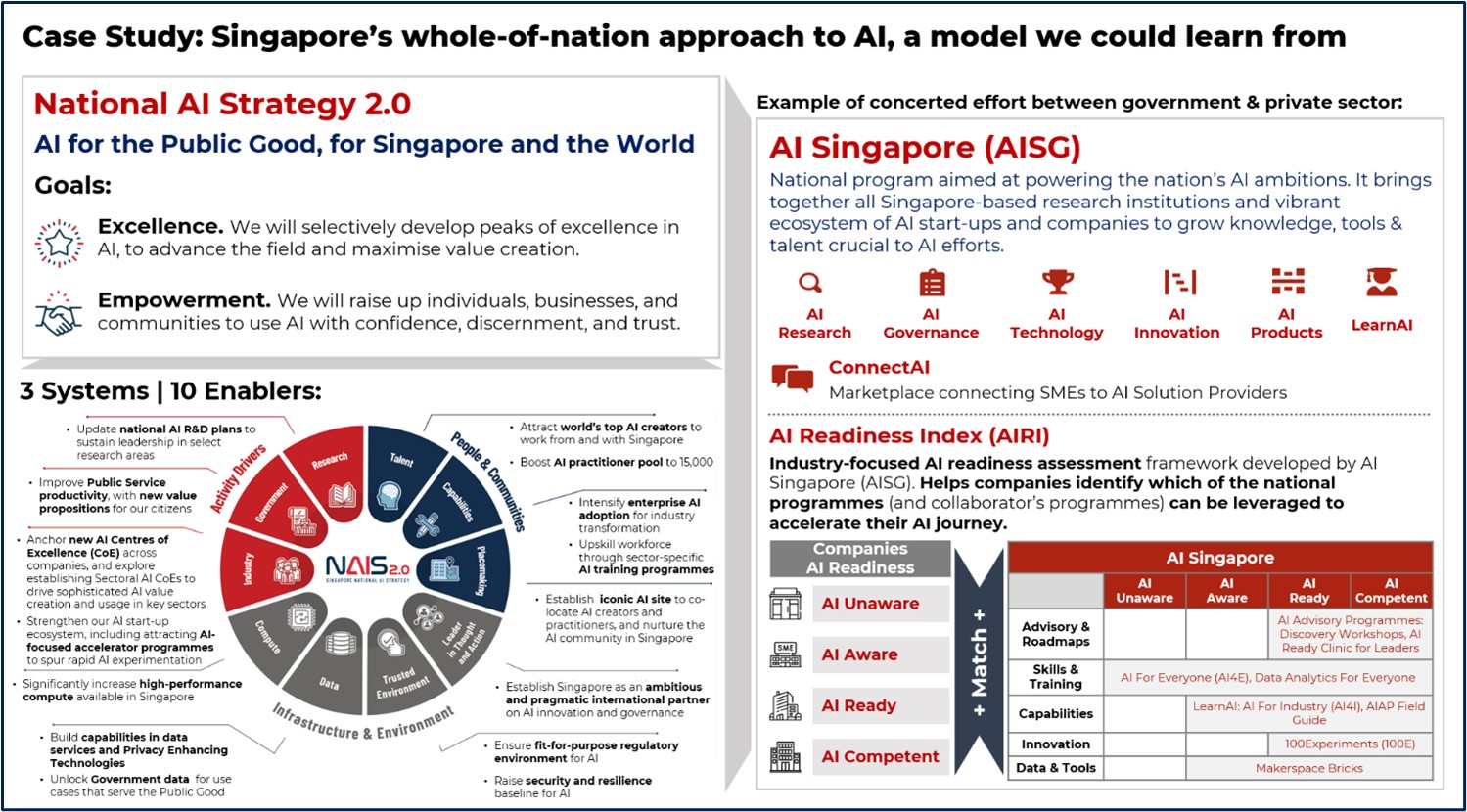
By Vicky Fan Yin Yan, supported by Ridzwan Hamzah
At the cusp of AI revolution, Malaysia stands poised to redefine our future through artificial intelligence. The question is: Is Malaysia ready to be at the forefront of AI?
As we navigate this transformative journey, the government plays a pivotal role in orchestrating our AI endeavours, ensuring concerted effort that drives towards our national digital ambitions. Despite having foundational policies and frameworks that encompass the usage of AI, they remain fragmented across multiple ministries and agencies, necessitating a more integrated approach to maximise the impact of AI in both the public and private sectors – a fundamental step for us to be a regional and global AI leader.
Furthermore, with increasing foreign investments from hyperscalers such as AWS and Microsoft in the realm of cloud and AI, we must take innovative strides and bold moves in formulating forward thinking national policies and regulatory frameworks, infrastructure development, data management and talent cultivation to ensure we are ready as a nation to capture the full value of these strategic investments.
Where are we in terms of AI Readiness?
Government AI Readiness vs Private Sector AI Readiness
Government AI Readiness
In the 2023 Government AI Readiness Index1, Malaysia’s AI readiness is competitive within the East Asia region, although it trails behind some regional leaders. According to the Index, East Asian countries such as Singapore, South Korea and Japan often rank highly due to their robust government policies on AI, advanced technological sectors and significant investments in AI research and infrastructure. In comparison, Malaysia, while performing well against other middle-income countries globally, still faces challenges, particularly in the areas of data availability and infrastructure readiness which are crucial for the comprehensive deployment of AI-integrated public services.
Figure 1: Malaysia ranks 6th in the Government AI Readiness Index 2023 within the East Asia Region (2nd in Southeast Asia)
Source: Oxford Insights – Government AI Readiness Index 2023
Note 1: The Government AI Readiness Index, produced annually by Oxford Insights, evaluates how prepared governments around the world are to implement AI in delivering public services. It ranks countries based on various factors across three pillars: Government, Technology Sector, and Data & Infrastructure, providing insights into the global landscape of AI integration in governance.
For Malaysia to bridge the gap with regional leaders, improvements must be made to enhance our digital infrastructure and data management protocols to support a holistic and equitable AI implementation plan that is accessible to all. In addition, a comprehensive and unified national AI strategy and framework must be established to guide and regulate the adoption of AI to enable Malaysia to flourish in the AI scene.
Private Sector AI Readiness
The 2023 Cisco AI Readiness Index2 reveals that only 13% of the companies in Malaysia are fully ready for AI. The Cisco AI Readiness Index investigates AI readiness across six (6) key pillars – Strategy, Infrastructure, Data, Governance, Talent and Culture; and categorises them into four (4) levels – Pacesetters (fully prepared), Chasers (moderately prepared), Followers (limited preparedness) and Laggards (unprepared).
Figure 2: Overall 13% of Malaysian companies are fully AI ready (Pacesetter)
Source: Cisco AI Readiness Index 2023 (Malaysia)
Note 2: The Cisco AI Readiness Index is based on a double-blind survey of 8,161 senior business leaders at organisations with 500 or more employees with responsibility for AI integration and deployment within their organisations. The organisations cover 30 markets across North America, Latin America, EMEA and Asia Pacific.
It is evident that the private sector in Malaysia is facing impediments in the journey of AI adoption and advancement, manifested in technical complexities (e.g. infrastructure readiness, data availability, and governance), workforce and organisation management (e.g. talent, culture), and governance (e.g. AI strategy, policy, and regulations). With over half of Malaysian companies having limited preparedness or barely ready for AI, there is a dire need for quick actions to close the AI readiness gap, as the companies race to be AI ready.
In the pursuit of positioning ourselves as an AI-driven nation, it is pivotal to acknowledge the importance of building an ecosystem of large corporates, small and medium enterprises (SME) and startups that move towards a wider common AI ambition of the country, supported by national policies and government initiatives.
Way Forward: Whole-of-Nation Approach to Boost AI Readiness
Concerted effort is required between government and private sector to achieve synergies for greater impact
To accelerate Malaysia’s AI readiness, the priority is to establish a unified and phased national policy and regulatory framework that sets the vision; research and development aspiration; guidelines; implementation strategy; and usage for AI development. This national policy should align with our country’s broader economic objectives and address various aspects of AI implementation, including ethical considerations, data privacy, and cybersecurity concerns. It should also complement or build on current policies and regulations, such as the New Industrial Master Plan 2030 (NIMP 2030), National AI Roadmap 2021-2025 (AI-RMAP), Personal Data Protection Act (PDPA), Malaysia Cybersecurity Strategy 2020-2024, just to name a few. This ensures both the public and private sectors have a common reference point to guide their AI effort and facilitate a smoother cooperation between the government and private sector.
Alongside policy development, there must be a concerted effort to upgrade our infrastructure and manage data effectively.
- Digital infrastructure – this involves not only physical components like data centres and network capabilities (where Malaysia is one of the leading countries with the most consistent 5G network) but also the digital architecture that supports AI applications, such as cloud services and advanced computing resources.
- Data management – this requires establishing data norms that ensure easy access to high-quality, standardised, and secure data. These efforts should be underpinned by robust cybersecurity measures to protect sensitive information and maintain public trust in AI systems.
The cultivation of talent is another critical focus area. Apart from nurturing talent who can contribute to the development and advancement of AI, we must also focus on developing a workforce skilled in using and integrating AI in their day-to-day operations. This would require a collaborative effort amongst the public sector (including incorporation of AI skill-based training at the National Institute of Public Administration, known as INTAN, for civil servants) and private sectors to encourage the upskilling and reskilling of the current talent pool, leveraging the curriculum and learning platforms of hyperscalers (AWS, Google, Microsoft) that are investing in Malaysia. These programmes should aim to not only serve the purpose of filling immediate skills gap but also to foster a culture of lifelong learning to stay relevant in the evolving technological landscape.
These strategic and focused efforts will position Malaysia at the forefront of global AI innovation and utilisation, enabling us to harness the full potential and value of AI.
Source: National AI Strategy 2.0, AI Singapore
Key Learnings we could draw from the current leader in AI Readiness:
- A unified and synchronised national policy is fundamental to galvanise the public sector, private sector and the people in achieving the same AI vision and goals of the country
- A centralised national AI programme with multifaceted guidelines, tools and initiatives accessible by businesses, institutions, individuals or any interested parties to foster a cohesive AI ecosystem
- An active and structured collaboration between government, private sector, and institutions is critical to share resources and align AI initiatives with national priorities
So, is Malaysia ready? With a clear vision to capitalise on existing AI investments, Malaysia should not shy away from the Game of Impossible, to become a leader in AI development and adoption.
Article Written by Vicky Fan Yin Yan, Senior Manager, and supported by Ridzwan Hamzah, Joint Managing Director (Interim) & Partner at PEMANDU Associates.
Frontier by PEMANDU Associates, aims to help businesses and governments achieve Big Fast Results through digitally-led transformations. Our approach is anchored on harnessing the value of data to formulate meaningful insights that are translated to impactful outcomes. From the initial stages of data mining and analytics through to the development of bespoke dashboards to guide interventions and decision making.
For more information on how we can assist your organisation in leveraging AI for growth and innovation, contact us at [email protected]. Together, we can shape the future of AI in Malaysia



